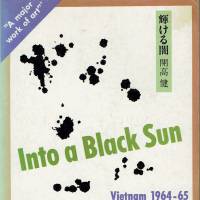Journalist Takeshi Kaiko covered the Vietnam War for the Asahi Shimbun, later fictionalizing his experiences in this novel about a Japanese journalist in Saigon and the Vietnamese jungle.
Into a Black Sun: Vietnam 1964-65, by Takeshi Kaiko.
224 pages
KODANSHA, Fiction.
Embedded with a U.S. Army company, the unnamed narrator leads the reader through the boredom and high drama of a war zone with philosophical objectivity and a wry sense of humor. After surviving a stint at the front he returns to Saigon, where he chases rumors between drinking sessions, attends writing groups, and enthusiastically explores the seedy underbelly of Saigon life. Tiring of this dissolute existence, he decides to rejoin the troops and follows them on a mission deep into enemy territory, where the novel reaches its climax.
"Into a Black Sun" is an irresistible blend of narrative and inquiry, a moving exploration of how war desiccates humanity. Through discussions with other journalists, translators, civilians, soldiers and monks, all angles on the conflict, from personal to ideological, are presented with equal weight. There is palpable anger at both sides: at the U.S., for interfering in an Asian conflict, and at the Communists, for presenting corruption as ideology.
Kaiko draws direct parallels between his experiences in Osaka during World War II. He admits respect for the Vietnamese monks who self-immolate in protest of the war, and laments a lack of similar resolve in Japanese intellectuals. As an activist he protested Japan's support of U.S. policy in Southeast Asia, and this fiery and honest account won him the Mainichi Cultural Award.
Read archived reviews of Japanese classics at jtimes.jp/essential.


















With your current subscription plan you can comment on stories. However, before writing your first comment, please create a display name in the Profile section of your subscriber account page.